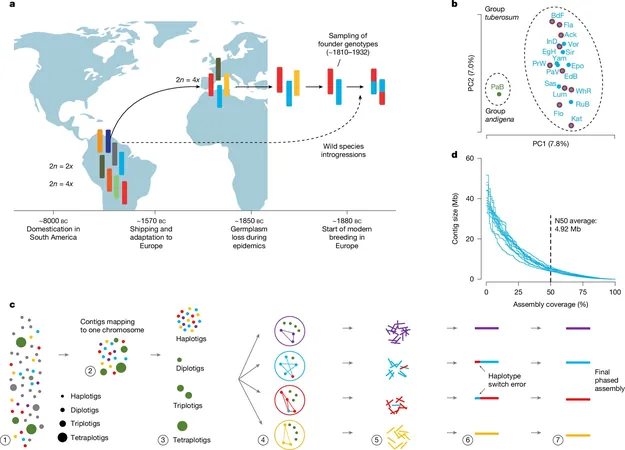
Revolutionary Potato Genome Breakthrough: A Green Goldmine with Stark Genetic Variability!
2025-04-16
Author: Rajesh
Unlocking the Secrets of Potatoes: The Backbone of Global Diets
Potatoes, a staple for over 1.3 billion people around the globe, are facing a crisis. Despite their critical role in food security, efforts to improve potato varieties have largely stagnated, with most of today's beloved cultivars originating from decades past. This stagnation is largely due to the potato's complex genetics, featuring four sets of chromosomes instead of the typical two, complicating traditional breeding methods.
Scientific Breakthrough: Decoding Historic Potato Varieties
In an exciting new study published in *Nature*, a team led by Professor Korbinian Schneeberger from LMU and the Max Planck Institute has made significant strides in potato research by decoding the genomes of ten historic potato cultivars. This groundbreaking work could streamline the way researchers reconstruct potato genomes moving forward, opening doors to innovation in breeding.
A Glimpse into the Past: Diversity in Legacy Potatoes
Together with collaborators from Wageningen University, the Leibniz Institute of Plant Genetics, and Xi'an Jiaotong University, the team examined potato varieties cultivated as far back as the 18th century. Professor Schneeberger noted, “Our aim was to assess the genetic diversity of these historical potatoes to unlock their potential for modern cultivation.” Shockingly, they discovered that the genetic diversity is alarmingly limited, with the ten examined varieties accounting for approximately 85% of the genetic makeup of contemporary European potatoes.
The Bottleneck Effect: A History of Genetic Reduction
This limited gene pool can be traced back to the potato’s introduction from South America in the 16th century, where a small number of individuals were brought to Europe. Many failed to adapt to the new environment, and various diseases further diminished diversity, culminating in events like the catastrophic potato blight of the 1840s that resulted in widespread famine across Europe.
Surprising Chromosomal Differences: An Unexpected Discovery
In a turn of events that astonished researchers, the study also unveiled that while the variety of chromosomes is scarce, the differences between them can be staggering—up to twenty times more diverse than those seen in humans! These variations likely emerged long before potatoes were brought to Europe, stemming from a rich history of wild species crossbreeding in South America over 10,000 years.
A New Era in Potato Genome Analysis
The researchers have devised a novel methodology that could revolutionize the analysis of the approximately 2,000 potato varieties registered in the European Union. Rather than producing extensive genomic data from scratch, their method compares easily obtainable data with existing genomic records to identify the chromosomes present in a given cultivar. This innovative approach has already shown promise with the Russet Burbank variety, a staple since 1908 and the go-to potato for French fries.
Empowering Future Crop Breeding with Genome Knowledge
As Professor Schneeberger emphasizes, “Understanding genome sequences is not just academic; it paves the way for a myriad of breeding strategies, from traditional practices to cutting-edge genome engineering. With these insights, the future of potato cultivation looks brighter than ever!”
This remarkable research holds the potential to reshape the future of one of the world's most important food sources, ensuring that potatoes continue to thrive on our plates for generations to come.





 Brasil (PT)
Brasil (PT)
 Canada (EN)
Canada (EN)
 Chile (ES)
Chile (ES)
 Česko (CS)
Česko (CS)
 대한민국 (KO)
대한민국 (KO)
 España (ES)
España (ES)
 France (FR)
France (FR)
 Hong Kong (EN)
Hong Kong (EN)
 Italia (IT)
Italia (IT)
 日本 (JA)
日本 (JA)
 Magyarország (HU)
Magyarország (HU)
 Norge (NO)
Norge (NO)
 Polska (PL)
Polska (PL)
 Schweiz (DE)
Schweiz (DE)
 Singapore (EN)
Singapore (EN)
 Sverige (SV)
Sverige (SV)
 Suomi (FI)
Suomi (FI)
 Türkiye (TR)
Türkiye (TR)
 الإمارات العربية المتحدة (AR)
الإمارات العربية المتحدة (AR)